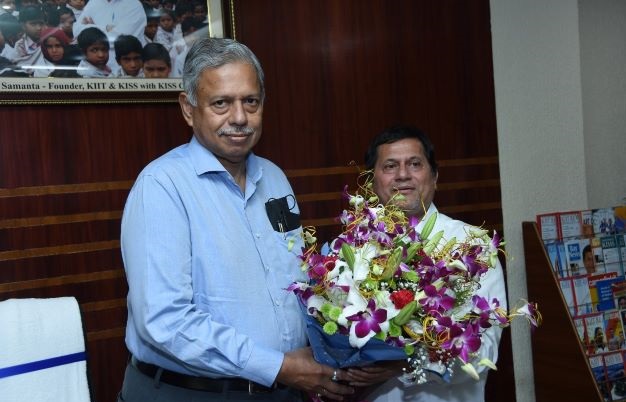By Our Correspondent
BHUBANESWAR: Leading RTI activists and legal fraternities have continued to raised questions on Odisha Advocate General Ashok Parija’s appointment as KIIT University’s Honorary Chancellor. Parija, took charge on September 29 after Prof. Ved Prakash completed his term. Some says Chancellor is an honorary position, so it will not hamper Parija’s work as Advocate General while others argued, if Odisha Government files any case against KIIT University, then what will be the role in AG, as he is sitting Chancellor of the said University
RTI activists Pradip Pradhan shared a post of Chitta Ranjan Behera, Advocate Orissa High Court, which reads as follows. The social media posts says Confusions are galore among the legal fraternity, media circles and as well independent intelligentsia across the spectrum, firstly as to whether the OIC (Odisha Information Commission), against whose Order the learned AG Odisha Sri Ashok Parija was briefed by a private body called KIIT to argue, albeit in his personal capacity, before the honorable Orissa High Court, is a state entity within the meaning of Article 12 of Constitution or not, and secondly, if so, whether it is a state entity operating within the jurisdiction of the State of Odisha or not.
A cogent answer to the 2nd ponderable, does in fact hold the key to addressing to the central problematique i.e. whether the said act of Sri Parija as the incumbent AG of Odisha did anyway conform to the letter and spirit of law laid down in Article 165 of the Constitution- the very article owing to which Sri Parija enjoys his present identity as the tallest Law Officer of Odisha state and his special rights and absolute immunities equal to that of a Minister, for partaking in any legislative proceeding of the state (vide Articles 177 and 194), not to speak of his fabulous remuneration that the Governor might allow to his satisfaction, along with a host of perks and privileges attendant on his eminent constitutional office.
The special concern that prompted this self-inspired author to look in depth into the above mentioned ponderable is a critical riposte by a former comrade of mine on Face-book, which justified the appearance of Odisha AG Sri Parija for a private party as against a state entity, quoting the ground of a precedent set by the immediately preceding AG Sri Surya Prasad Mishra who, according to him, had appeared for a private party in dispute with a state entity called NHAI (National Highway Authority of India).
Without going into the factuality or otherwise of this case, this author has no hesitation at all in saying, were it a fact that the former AG of Odisha Sri Mishra stood against NHAI (a state entity) in favour of a private party, he has committed no mischief, for the simple reason that NHAI is a state entity operating, as its nomenclature suggests, as an instrumentality of the Central Government, whereas the Odisha Information Commission, which, as we shall see in detail, is a state entity operating as a quasi-judicial, statutory authority within the jurisdiction of the State of Odisha.
There are umpteen cases one can cite where the earlier AGs and even present AG of Odisha have fought against the Central level state entities and also against other state governments and their instrumentalities, and that is exactly what they are mandated to do in their statutory capacity of Advocate General for the State of Odisha. For instance, in the landmark case around Niyamgiri vide WP (C ) No. 180 of 2011 that was decided by the Supreme Court on 18 April 2013, two state actors, namely Orissa Mining Corporation Ltd ( a state instrumentality of the State of Odisha) and Ministry of Environment and Forests (a state instrumentality of Government of India) fought against each other and then AG of Odisha had, obviously enough, taken the side of OMC running counter to the Min. of E&F, GoI.
More obvious is the adversarial role that the AG of a State ought to play in a case lodged against another State Government, such as Odisha versus Andhra Pradesh, which is now running in Supreme Court around the disputed borders of Kotia Gram Panchayat. Thus, precisely speaking, the bottom-line for an AG of Odisha is the inviolate maxim that he can favour or oppose any entity private or state in a court dispute, but certainly can’t go against the State of Odisha as such or any of its instrumentalities.
And that is exactly where the incumbent AG Sri Ashok Parija did err and that too egregiously, maybe, due to his innocent ignoramous-ity or his studied complicity with the concerned private business-party in lure of some fabulous gratification, known best to him and his beneficiary-client. Either way, Sri Parija has wrecked a terrible, nay, an undo-able disaster to the august constitutional office of Advocate General of Odisha by embroiling it in a conspicuous case of conflict of interest.
Now, coming to another contested issue as to whether the Odisha Information Commission deserves the epithet of a state entity belonging to the State of Odisha or not- raised by some senior lawyer friends- we need to look at some salient aspects of the birth, constitution, financing and functioning of the Commission in juxtaposition to the AG of a State, and that too exclusively from a statutory perspective, in order to put all doubts at rest, for good.
Firstly, though the Central law i.e. RTI Act 2005 in its Section 15 provided for the constitution of a Commission for every state, the specific entity called Odisha Information Commission came into being by Govt of Odisha’s I & PR Notification No. 495/2005 dated October 29, 2005 issued on the Order of the State Governor, just as Sri A.K. Parija was appointed as the AG of Odisha by a Govt of Odisha Notification vide No. I-LR-AG-21.195981 dated 24.06.2019. Then, it is the self-same Governor of Odisha who has appointed all the Information Commissioners of Odisha [Section 15(3) of RTI Act 2005] just as all the Advocate Generals of the State including Sri Ashok Parija the present incumbent [Article 165(1) of Constitution]. The self-same Governor Odisha is also the disciplinary authority in respect of both State AG [Art. 165 (3) of Constitution] and Information Commissioners (Section 17 of RTI Act 2005) for the purpose of removal from the office. The salaries and allowances etc payable to the Information Commissioners and staffs of the Commission and as well the entire expenditure for the performance of the Commission is to be borne by the State Government (Section 16 of RTI Act 2005) just as the remuneration for the Advocate General is sourced from the State exchequer as determined by the Governor [Article 165(3) of Constitution].
Moreover, the functioning of Odisha Information Commission is governed by Odisha Information Commission (Appeal Procedure) Rules 2006 read with Odisha RTI Rules 2005 and Amendment Rules 2006, all of which being the ultimate creatures of Odisha Legislative Assembly are doubtless the definite instrumentalities of the State of Odisha. Thus, keeping in view these constitutional and statutory provisions which are loud and clear, there shouldn’t linger any misgiving in any quarter as to the fact that the Odisha Information Commission is not only a state actor in general within the meaning of Article 12 of the Constitution, but also a state actor belonging to the domain of the State of Odisha in particular.
Under the circumstances, Sri AK Parija the incumbent AG of Odisha by sub-serving in disguise the KIIT, a private business entity in opposition to Odisha Information Commission, an established and full blown state actor belonging to the State of Odisha, has not only profaned the office of AG Odisha, but also committed a terrible sacrilege against the constitutional provisions governing the Advocate General for a State., the social media post added.






























